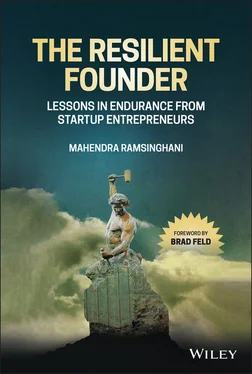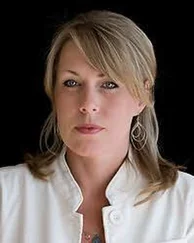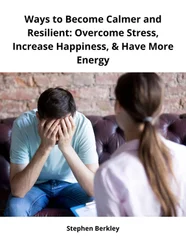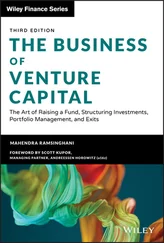Mahendra Ramsinghani - The Resilient Founder
Здесь есть возможность читать онлайн «Mahendra Ramsinghani - The Resilient Founder» — ознакомительный отрывок электронной книги совершенно бесплатно, а после прочтения отрывка купить полную версию. В некоторых случаях можно слушать аудио, скачать через торрент в формате fb2 и присутствует краткое содержание. Жанр: unrecognised, на английском языке. Описание произведения, (предисловие) а так же отзывы посетителей доступны на портале библиотеки ЛибКат.
- Название:The Resilient Founder
- Автор:
- Жанр:
- Год:неизвестен
- ISBN:нет данных
- Рейтинг книги:3 / 5. Голосов: 1
-
Избранное:Добавить в избранное
- Отзывы:
-
Ваша оценка:
- 60
- 1
- 2
- 3
- 4
- 5
The Resilient Founder: краткое содержание, описание и аннотация
Предлагаем к чтению аннотацию, описание, краткое содержание или предисловие (зависит от того, что написал сам автор книги «The Resilient Founder»). Если вы не нашли необходимую информацию о книге — напишите в комментариях, мы постараемся отыскать её.
The Resilient Founder: Lessons in Endurance from Startup Entrepreneurs,
The Resilient Founder
The Resilient Founder — читать онлайн ознакомительный отрывок
Ниже представлен текст книги, разбитый по страницам. Система сохранения места последней прочитанной страницы, позволяет с удобством читать онлайн бесплатно книгу «The Resilient Founder», без необходимости каждый раз заново искать на чём Вы остановились. Поставьте закладку, и сможете в любой момент перейти на страницу, на которой закончили чтение.
Интервал:
Закладка:
To invert this effect, and calibrate your self-image, try to think about any skill in which you believe you are the best. Adjust that self-score downward by 5X and then start working toward building your skill. As your skill improves – voilà – the self-image gets calibrated magically.
Researchers have found that those who have high expectations of themselves and have a vulnerable ego are susceptible to suicide. What is this ego? And should it be vulnerable? Can it become stronger? Being unaware of such basic psychological notions, we are unable to decipher, let alone harness this strange inner force. Pick any book with its esoteric pearls of wisdom and you will find references to destroy your ego . The ego is an enemy . This is a fundamentally flawed notion in the context of entrepreneurship. Just as money is not the root of evil, but an excessive lust for money is, the ego is not the enemy. An inflated out-of-control ego, like an unbridled horse, is the enemy. A weak ego, unable to handle responsibilities and frustrations, overwhelmed perpetually is the enemy. The healthy ego, in fact, can be a founder's greatest ally, an essential resource in changing the world.A healthy ego is your wingman, your charioteer, your guide. It helps the entrepreneur to navigate the journey. It tackles everything with the ease and grace of an agile problem solver. A healthy ego could even become a force for good in society.
Having strong views of their own selves is supremely important for founders. It is indeed a precondition. A vulnerable ego can turn that same strength against its own self, destroying the inner drive. Freud holds the view that when we do not get what we yearn for, we turn against that very object of yearning. Sometimes that object can be our own life.
When Tim Ferris was contemplating suicide, he could well be yearning for something that he could not get. The self-view as a loser soon starts to propagate. The loser's mind then starts to descend into a steady drumbeat: “The world does not need another loser.”
From the trio of image, expectations, and ego, founders can turn some knobs around. We can paint our own self-image as work in perpetual progress. We can forgive ourselves and others and accept that we are not fully formed Greek Gods. At least not yet.
Our expectations of our work can be tied to self-transcendence as opposed to being stuck on hedonistic treadmills.
Our self-confidence need not collapse into self-doubt, leading into a downward spiral of fear and anxiety.
Above all, I often wonder if our ego can save us from frustrations, exhaustion, and this gnawing sense of hopelessness.
If yes, how do we go to this “ego-gym” and build this strange muscle inside us, in a healthy way?
Especially when the world out there has declared the ego to be the enemy.
The Tyranny of Ambition, the Agony of Success
The siren call of suicide is not exclusively restricted to those who have suffered setbacks or failure. Successful founders have often struggled with a sense of loss after the victory lap has been completed. An investor I knew really well committed suicide. He was a great friend, someone I would call as often as three times a week. We talked often, bantered, had fun, and had co-invested in dozens of companies. We spent time together on the cap-table as well as the dinner table. When in town, he would often stay with me. He was a part of mia familia yet I was clueless about his mental anguish. To this day, I wonder why he committed suicide, when he had made his millions.
In his self-view, he may have lost his motivation, facing some inner hurdles. In his worldview, maybe there was no further joy, contentment, or challenges. Successful founders often experience a feeling of emptiness, a void.
L'appel du vide
This French phrase roughly translates to “the call of the void” – that strange fleeting urge to jump when standing atop high buildings, peaks. When you get up to the higher levels of the Eiffel Tower, some might get the call of the void. They have nets all over to prevent people from jumping, and for most, this fleeting urge passes in seconds.
Such a call of the void often comes after those millions have been banked. The lack of an ongoing challenge, no monsters to wrestle with, puts an energetic founder in a state of helpless despair. There are no problems to solve anymore, what should I do with myself? Maybe create a new start-up? And thus we stay trapped on the treadmill.
Irvin Yalom, author and therapist in Silicon Valley, writes that “the success of young high-tech millionaires generates a life crisis that can be instructive about non-self-transcendent life-meaning systems.” In other words, the millionaires are stuck with “What next?” Making the millions did not transcend their own selves. They start new companies, try to repeat their success. Why? They tell themselves they must prove it was no fluke, that they can do it alone, without a particular investor, partner, or mentor. They raise the bar. They no longer need 1 or 2 million in the bank – they need 5, 10, even 50 million to feel secure. They realize the pointlessness and irrationality in earning more money when they already have more than they can possibly spend, but this does not stop them. They realize they are taking away time from their families, from things closer to the heart, but they just cannot give up playing the game. “The money is just lying out there,” they tell themselves. “All I have to do is pick it up.”
A successful entrepreneur who made a ton of money or a failed one who did not make any both ended up at the same juncture.
Money, fame, and success are not necessarily an antidote for our inner chaos.
DOES OUR ATTITUDE DEFINE OUR OUTCOMES?
When things are working out well, our self-confidence starts to soar. We end up tasting the elusive yet delicious elixir of success – fame, fortune, and glory. Our sense of well-being flourishes. We become benevolent members of society, sharing our gifts, glowing in the attention. We feel good about ourselves and our achievements and perch atop the apex of the self-actualization pyramid, our joy flowing, serving the society for a greater good. Even if all this is for a fleeting moment, we sure aspire for, and relish this moment.
But more often things don't quite work out. Our ambitions are often greater. Reality bites. And if our plans do not come to fruition, we succumb to an angry, arrogant, disillusioned state. Our self-confidence shrivels up, and we can descend into fear, despair and depression.
From such a dark state, we can decide to move into a state of self-reflection and improvement, and develop a path toward adjusting our self-images and skills. See Figure 1.1.
But more often than not, it is easy to stay stuck in that lower left corner. Is there a way to move to another box, ideally the one in the top right corner? Entrepreneur Ben Huh, whose suicidal tendencies trapped him in a dark room for a whole week, finally walked out. He does not recall why he left the room, but wrote that the most meaningful act he performed was to leave that room . In doing so, he saw the positive in the very act of moving out of darkness. “Dealing with reality was the best antidote to a make-believe world. Instead of fantasizing about death, I decided to deal with the harshness of reality,” he writes.
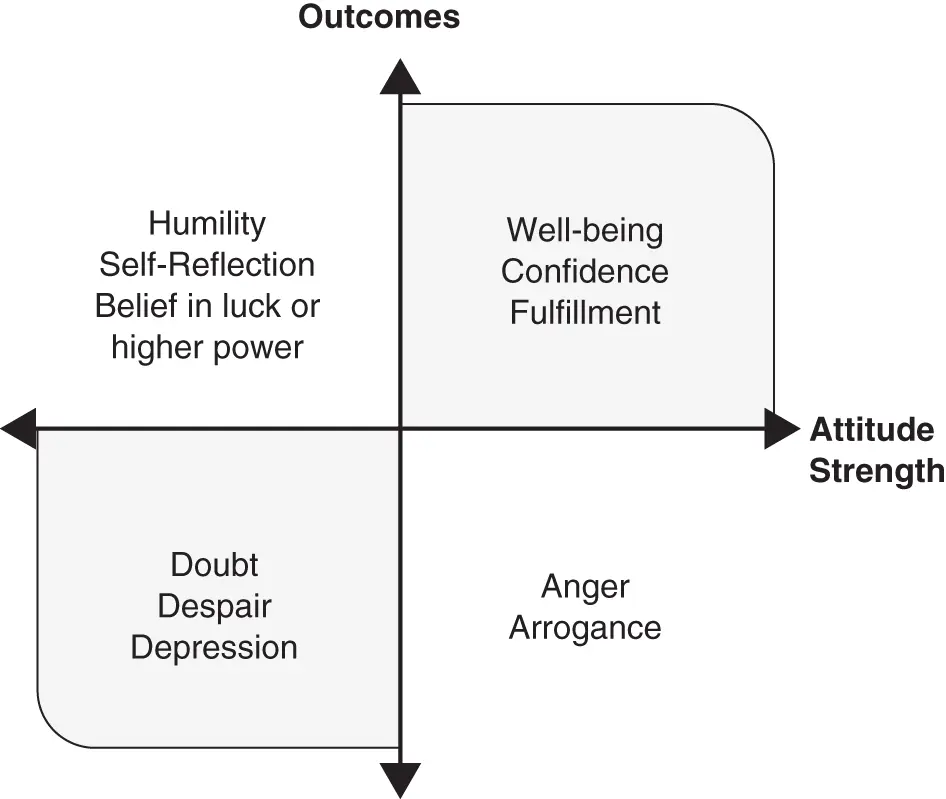
Figure 1-1 Do our attitudes define our outcomes?
Ben blogged openly about his inner struggles. His expressions resonated with founders worldwide.
Читать дальшеИнтервал:
Закладка:
Похожие книги на «The Resilient Founder»
Представляем Вашему вниманию похожие книги на «The Resilient Founder» списком для выбора. Мы отобрали схожую по названию и смыслу литературу в надежде предоставить читателям больше вариантов отыскать новые, интересные, ещё непрочитанные произведения.
Обсуждение, отзывы о книге «The Resilient Founder» и просто собственные мнения читателей. Оставьте ваши комментарии, напишите, что Вы думаете о произведении, его смысле или главных героях. Укажите что конкретно понравилось, а что нет, и почему Вы так считаете.
